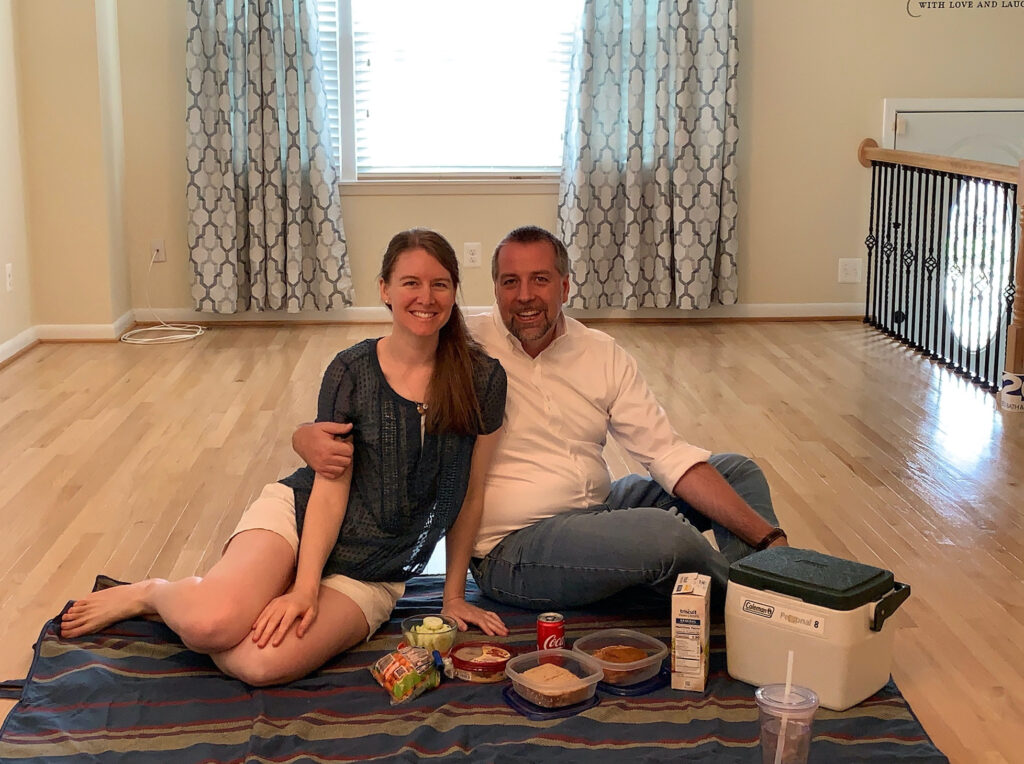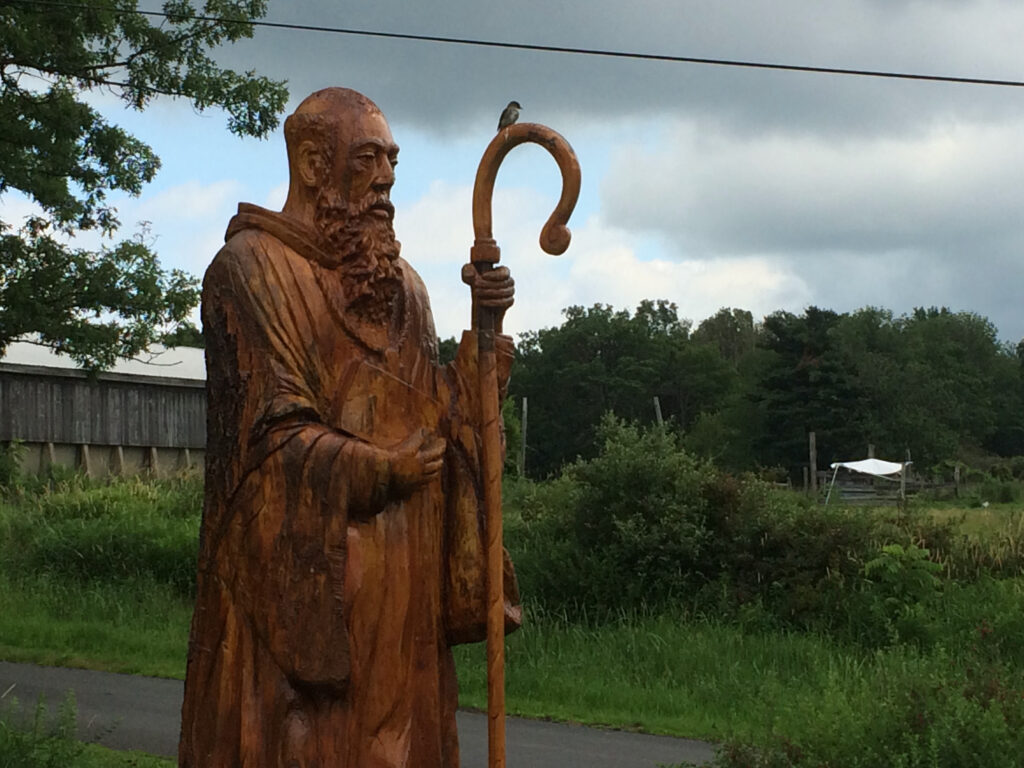Feast Day: February 10 (Scholastica) and July 11 (Benedict)
Catholics have a patron saint for everything. Having trouble firing up that barbecue? The Romans literally grilled St. Lawrence to death, so he’s a great one to help you out. Putting together a fireworks show or running an artillery battalion? Call on St. Barbara, a Roman lass whose father got struck by lightning after he had her killed for refusing to obey him. Want to sell a house? Bury a statute of St. Joseph upside down in your yard, then dig him up when the deal closes and put his statue in a place of honor in your new home. You can use him to buy a home too—a perfect realtor.

I know people who swear by the efficacy of the St. Joseph trick. Personally it seems to me a little too close to superstition. However, I do like having a friend in heaven with some human experience of my problems to spiritually accompany me. So when my wife and I decided it was time to stop renting and to buy our first house, we knew we’d be asking a saint to help us. As much as I admire Joseph, I wanted someone else. Besides everyone else is always talking Joe’s ear off, so surely choosing someone less popular would get us more attention from them—right?
So my wife and I agreed on a brother-sister pair of patron saints for our house hunt. Then the weeks passed. Perhaps, just maybe, we had chosen poorly?
Choosing Saints Benedict and Scholastica
I probably would not have suggested praying to Saints Benedict and Scholastica for their intercession if not for one of my old theology professors at Notre Dame. Benedict, a sixth-century Italian noble, created the most influential branch of western monasticism and wrote a rule of life for monks and nuns (including his sister Scholastica) this is still followed today by tens of thousands of men and women. I had been rereading Benedict’s Rule for my studies and the professor casually mentioned that he sometimes recommended it to young student couples preparing for marriage.
I could see his point. While his Rule is not designed for the average lay person, Benedict had a deep and loving insight into the daily task of community. Some of his best passages structure the mundane rhythm of life as when (c. 35) he insists every person take a turn in the kitchen to waiting on others, clean dishes, help fellow servers, and concretely serve each other in love. This can be read next to his earlier insistence (c. 31) that the cellarer “look on all the dishes and possessions of the monastery as if they were the sacred vessels of the altar” (see, for example, this Catholic mom’s reflection). Imagine treating each dish you serve or clean as a little bit of God’s sacrament of love offered for each person in your household.
Benedictine monks and nuns promise stability as one of their vows. They pledge themselves to a particular community for the rest of their lives. If that is not inspiring for modern marriage then I don’t know what is. It certainly seemed like a good fit for a couple trying to buy a home. Since Benedict’s sister, Scholastica, can be considered the founder of female Benedictine life, we also had two saints to root for us in a nice male-female duo. With such guarantors of stability and loving community on our side, how could we fail?

House Hunting in 2022
I think our fourth rejected offer is what finally began to shake us. At the time, my wife and I had been renting a townhome in the western suburbs of Baltimore and hoped to find a nice, small detached home in a safe neighborhood there. By our fourth offer, we were scrambling for small townhouses almost an hour to the east of the city on the busy I-95 corridor. The townhouse came on the market Friday and offers were due in three days. We put in a good offer, substantially over the asking price, waiving inspections and tossing in an appraisal guarantee along with other sweeteners. Our real estate agent (who really was wonderful) gave us the bad news a couple days later. Twenty-nine offers had come in. We had lost again.
Looking back, I can only laugh in bewilderment at the crazy market. At the time, I just felt tired. We saw a few other houses (and, yes, looked for signs from God or St. Scholastica) without much luck and without any successful offers. That’s when my wife suggested that we maybe needed to take a small break. We needed to pray about why we were banging our heads against a brick wall trying to find a townhouse we only sort of liked forty-five minutes away from our closest friends.
At the end of the week, we sat down to talk. I let her go first since she had much deeper connections to Baltimore than I. She said what I had also been thinking—we should move closer to family. Housing was cheaper nearer either of our parents. We’d have a community there. As our families aged and new children came along, we’d be a part of it. We looked at friends and saw the joy some of them had at being near family as well as the difficulties of being away that other friends faced. That’s ultimately how we came to NY.
St. Scholastica: Of Plans and Love
We had started our house hunt with a novena of prayers to St. Scholastica, whose feast day is in February, the month we started the search. As I reflected on our foiled house plans, I realized the mistake in our approach. I knew Benedict well; I should have paid more attention to her. If I had, I might have seen this coming. To be fair, Scholastica’s one of those quiet saints who is easy to overlook. Actually the only historical record of her comes in two little side stories in the Life of St. Benedict by Pope Gregory the Great.

One of the two stories relates a fairly common trope: Benedict had a vision of his sister’s death in which her soul rose up to heaven in the form of a white dove. The first story, though, is unique in saint’s lives.
Benedict had been visiting Scholastica and having such a wonderful conversation that he lost track of time. Then Benedict looked at the window at the fading light of the clear afternoon sky and, realizing the hour, told his sister that he had to go. Scholastic protested, Benedict insisted. So Scholastica quietly clasped her hands and bowed her head in prayer.
Instantly a lightning bolt split the sky. A torrential rain began to fall, making travel impossible. Benedict looked at her aghast and demanded, “May God forgive you! What have you done?”
Scholastica calmly smiled. “You wouldn’t listen to me, so I appealed to God and He listened to my prayer. Go ahead and leave me now if you still think you can.”
Gregory tells us that they spent the night in a conversation about God that benefited both greatly. He drew two lessons. First, not even a great saint like Benedict could always get his way. Second, it is no surprise that God chose to answer Scholastica’s prayer over Benedict’s wishes because God is love and her prayer flowed from the greater love.
A Reflection on Patron Saints and Openness to Being Thwarted
If Scholastica could turn her saintly brother’s plans on their head, I should have known that asking her to help with my plans invited the same kind of interference. Of course she wasn’t going to help me find a house in Maryland. Nope, she was going to make me move five minutes away from my sister (and my adorable nephew).
I don’t mind. I really don’t. I can’t even really blame Scholastica for meddling since my wife and I had invited her. Sometimes it’s best to have our plans foiled and to be open to something different. That’s the case here, at least so far. I’ll admit that the housing market played havoc with lots of people’s plans, but I do believe that my and my wife’s new path got a little nudge from above.
Our little foray into adopting a patron saint also reminds me how different prayer is from magical and superstitious approaches to religion. In magic, we try to rebel against the fact that we never fully control anything in our world. We want control that we can never have. Magic is fake. It denies realities.
Prayer, in contrast, both accepts and transforms reality. In prayer, we embrace the fact we don’t have full control and we trust God with that vulnerability. That trust opens us to change (or more specifically growth) in ourselves. It also invites God to do something in our lives and world. He may change things like we wanted. He may not. If not, however, trust and pay attention—He and our friends above may be doing something much better.
As we move into Lent this week, most of us are thinking about giving up something. Giving up a treat is not an end in itself; it’s training. So ask yourself: can I trust Him, pray with openness this Lent, and give up a little of my need for control?
If you have a response, thoughts, or questions, please comment at the bottom of the page! As always, keep it polite and charitable. If you enjoy these posts, consider subscribing to get email notifications about new reflections.


